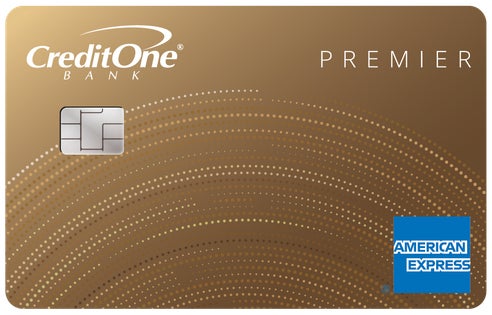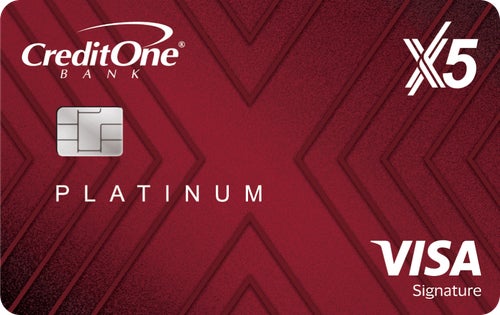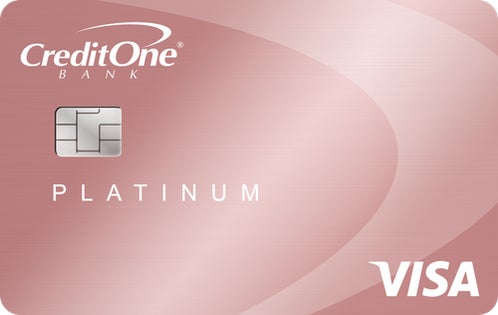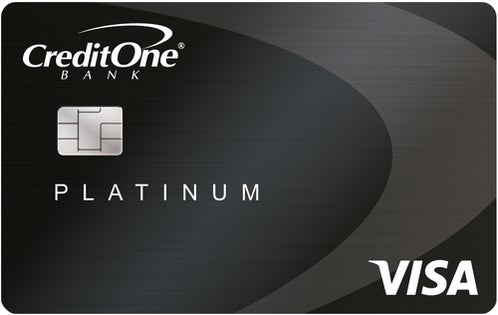All information about the Credit One Bank Platinum Visa for Rebuilding Credit card has been collected independently by CreditCards.com. The issuer did not provide the content, nor is it responsible for its accuracy.
A guide to Credit One credit cards
Credit One Bank is a major leader in the credit card industry with humble beginnings that has expanded quickly into a national authority. For 35 years, Credit One has provided consumers, primarily within the fair to good credit range, with well-rounded and accessible credit card options that offer cash back rewards on everyday purchases.
Best Credit One Bank credit cards compared
| Card name | Best For | Annual Fee | CreditCards.com review |
|---|
| Credit One Bank® Premier American Express® Card | Best for fair credit | $39 | Review |
| Credit One Bank® Platinum X5 Visa Signature® | Best for rewards | $95 | Review |
| Credit One Bank® Platinum Visa® for Rebuilding Credit | Best for bad credit | $75 first year, then $99 annually ($8.25 per month) | Review |
| Credit One Bank® Platinum Rewards Visa® with No Annual Fee | Best for no annual fee | $0 | Review |
| Credit One Bank® Platinum Visa® | Best for cash back | $39 | Review |
Editor’s picks: Credit One credit card details
Credit One Bank American Express® Card: Best for fair credit
Why we picked it: This is a solid, low-cost card for those with fair credit looking to strengthen their overall credit health. Credit One and American Express have paired to offer low fees and a straightforward rewards structure of unlimited 1% cash back on all purchases (terms apply). Its simplicity gives this card a lot of value.
Pros: This card gives the opportunity to raise your credit line based on your overall credit performance and free access to your Experian credit score, two useful tools for improving your credit score. Plus, if you’re interested in applying, but worried about your credit taking a hit due to uncertain approval odds, you can check online to see if you prequalify with no impact to your credit score.
Cons: The card comes with a pretty high regular APR, making it extra important to be sure you avoid carrying a balance. The card also comes with an annual fee of $39, so you can find more affordable, more rewarding cards if your credit score allows it.
Who should apply? Those looking for consistent rewards from a card that can help you get started on the path to a good credit score should consider this option.
Who should skip? A fee-averse shopper may want to check out their no annual fee options before committing to this card’s $39 yearly price tag.
Read our Credit One Bank American Express card review.
Credit One Bank® Platinum X5 Visa Signature®: Best for rewards
Why we picked it: This card offers a lavish rewards structure that’s hard to beat among other credit-building cards: Earn 5% cash back rewards on eligible gas, grocery, internet, cable, TV and cell service purchases (up to the first $5,000 in purchases per year, then 1%).
Pros: You still earn 1% cash back on purchases that don’t fit the bonus categories (terms apply), making every eligible swipe worth something. Plus, you’ll get a whopping 10% cash back through Credit One’s More Rewards Program, which is a card-linked offer program. On top of the rewards, you can check if you pre-qualify online and track your credit score with free access through Experian.
Cons: Your earnings at the 5% rate are limited to $5,000 of purchases per year, then will go to 1%. Also, the card’s regular APR is pretty high and it comes with a $95 annual fee.
Who should apply? If you foresee yourself spending largely in the high-rate categories, this card can offer big benefits to your everyday shopping. To take full advantage of all this card has to offer, keep a close eye on rewards opportunities through the More Rewards Program and you could easily negate the annual fee.
Who should skip? Someone with great credit looking for a high cash back rate might want to explore their other options. There may be a card with more lenient limits on your bonus cash back.
Read our Credit One Bank Platinum X5 Visa review.
Credit One Bank® Platinum Visa® for Rebuilding Credit: Best for bad credit
Why we picked it: If you have a bad or fair credit score, it can be difficult to find a well-rounded card in your credit range. Luckily, this card accepts a generous range of credit scores (300 to 670), allows you to check if you prequalify, doesn’t require a security deposit and comes with valuable perks.
Pros: There’s no set schedule, but your account will be automatically reviewed for credit line increases – an essential to improving your credit utilization (and your credit score). To regularly track your score, you’ll have access to a free Experian credit score and report summary every month. Cardholders also earn 1% cash back on eligible gas, grocery, mobile phone service, internet, cable and satellite tv purchases (terms apply).
Cons: The card starts with a low credit limit at just $300 and if you were to carry a balance, you’d face a high APR. The annual fee is $75 the first year and $99 in subsequent years ($8.25 per month). If you have good or better credit, you can likely be accepted for a more valuable card with better rewards.
Who should apply? This option’s ease of approval, credit-building benefits and cash back rewards make it a good starter card for those trying to climb towards good or excellent credit.
Who should skip? An experienced cardholder capable of being approved for a friendlier APR and annual-fee-structure should explore other card options.
Read our Credit One Bank® Platinum Visa® for Rebuilding Credit review.
Credit One Bank® Platinum Rewards Visa® with No Annual Fee: Best for no annual fee
Why we picked it: You can track your credit score online with a free Experian credit report each month and have your account regularly reviewed for a credit limit increase with this card. There’s also no penalty APR for a late payment and some lucrative rewards available, all for no annual fee.
Pros: Cardholders get 1% cash back on eligible purchases at grocery stores and gas stations, as well as cellphone, internet, and cable and satellite television services. Plus, the Credit One’s More Rewards Program can take the value of these rewards up a notch, boosting them by as much as 10% from participating merchants. Potential cardholders can also check for pre-qualification ahead of time to see if they’ll have access to things like zero fraud liability and a flexible payment schedule.
Cons: You’ll want to avoid carrying a balance month to month due to this card’s high APR. It also comes with a $1,000 credit limit which is generous for a credit building card. Managing a budget and tracking your spending will help salvage your score in the long term.
Who should apply? Thanks to its widespread rewards and no annual fee, this is a great everyday-use card for those looking for a cash back and credit-building combination.
Who should skip? Someone who knows they’ll have to carry a balance may want to avoid this card’s steep APR and look to 0% APR cards for a solution.
Read our Credit One Bank® Platinum Rewards Visa® with No Annual Fee review.
Credit One Bank® Platinum Visa®: Best for cash back
Why we picked it: You’ll earn unlimited 1% cash back on all eligible gas, cell phone, internet, grocery store, cable and satellite TV purchases, plus have access to free online credit monitoring and a flexible payment schedule while avoiding an annual fee.
Pros: This card gives access to many perks, including fraud protection, automatic account reviews for credit increases and discounts from participating retailers through Credit One’s More Rewards. You can also set up custom payment reminders to be certain you don’t fall behind on bills.
Cons: While the cash back earnings are nice for a starter card and those trying to improve poor credit, you can find more rewarding options elsewhere. It also features a short initial credit limit at $300 and a high APR.
Who should apply? While some of the other cards here may have more to offer, this is still a viable option for newcomers and those trying to grow their credit score thanks to its consistent rewards and perks to help credit building.
Who should skip? If you’re looking for some flexibility with how much you can spend, you may want to look elsewhere. This card’s starting credit limit of $300 doesn’t allow for a high budget or low credit utilization.
Read our Credit One Bank Platinum Visa review.
What is Credit One Bank?
Credit One Bank describes itself as “a technology and data-driven financial services company” that started as a single-standing full-service bank in 1984. Since then, it has quickly grown into one of the top credit card issuers in the country, acquiring millions of accounts. As one of the largest issuers in the United States, Credit One Bank distributed $7.75 million in 2020 charitable donations and over $172 million in cash back rewards paid.
The bank offers an array of different cards and structures, but the majority of its products appear to be designed with a certain type of customer in mind. Consumers in the fair to good credit range looking to be rewarded shouldn’t overlook the best Credit One credit cards thanks to their cash-back generosity and the ability to grow your credit. As the bank continues to grow, Credit One has also become the official credit card for large sports teams and corporations, such as NASCAR, the Big 12 Conference, and Las Vegas’ hometown squads, the Raiders and Golden Knights.
Credit One strives to help their customers improve financially, offering a plethora of resources for credit building, financial education and credit basics. In addition, Credit One offers advice such as “5 Ways to Help Pay Down Debt” and “How to Improve Your Credit Score- 5 Quick Methods”, useful resources for continuing or starting your credit-building journey.
How to choose the right card for you
When choosing a credit card, start by evaluating where you stand financially and ask yourself what you want out of a card. By using a tool like CardMatch, you can sift through your personalized offers based on your credit profile with ease and may find Credit One cards in your range.
Credit One provides a multitude of options that can help your credit score grow, and while other high-end credit cards may have flashier benefits and rewards structures, here you can find better than average rewards structures for those with less than stellar credit. To compare between Credit One cards, consider how the rewards categories, fees, APRs and credit-building benefits directly apply to your lifestyle before making a decision. For select customers, the final call could be a bit easier.
Who should get a Credit One Bank card
- The credit-builder: If you have thin or bad credit, The Credit One Bank® Platinum Visa® for Rebuilding Credit or the Credit One Bank American Express® Card can empower you to make wise credit and spending decisions. Both cards offer decent rewards structures and tools to help you manage your credit, but the annual fee for the Credit One Bank® Platinum Visa® for Rebuilding Credit is $75 the first year and $99 thereafter ($8.25 per month), while the Credit One Bank American Express® has a flat $39 annual fee.
- The rewards seeker: The Credit One Bank® Visa® Cash Back Rewards card could be an ideal choice for the everyday shopper seeking to rack up the rewards. With a low annual fee and cash back earning potential, this card can offer you the tools you need to get some cash back rewards in the bank.
- The maximizer: If you’re in the good to excellent credit range and looking to maximize your potential rewards earnings, the Credit One Bank® Platinum Rewards Visa® with No Annual Fee is a good choice. Complete with a slightly higher rewards structure than the Visa® Cash Back, you won’t have to worry about an annual fee cutting into your cash back.
Who should skip a Credit One card
- The frequent flyer: Credit One does provide cards for particular travelers, but someone who wants to earn on airline miles and travel internationally should look to airline, hotel or general travel credit cards.
- The experienced cardholder: Someone with an excellent credit score or even slightly below might want to explore other options before committing to a Credit One card. The higher credit score could give you access to more luxurious benefits, friendlier terms and high-end rewards, so taking a second to see where you stand is worth your time.
- The spending strategist: Someone who likes to earn rewards through specialty limited-time offers and savvy spending may want to explore other options. While Credit One gives plenty of opportunities to earn rewards, other providers may offer something more enticing for those on the hunt for sign-up bonuses and chances to earn more through rotating categories.
What credit score is needed for a Credit One Bank credit card
Credit One gives routes for cardholders with poor and fair credit to improve their scores while still earning cash back. Some of their cards, like the Platinum Visa for Rebuilding Credit, will approve cardholders with bad credit scores (in the 300 – 579 range). Their more rewarding cards may require a fair credit score (from 580 – 669) to qualify, but you can check ahead of time to see if you prequalify and avoid a hit to your credit score.
What are the benefits of having a Credit One card?
There are many credit-building features and benefits that come with having a Credit One credit card. When used responsibly, a Credit One card could be the tool you need to strengthen your credit health and stay on track. Here’s what this bank issuer offers:
Credit-building tools
- Free credit score: You’ll gain online access to your Experian credit score and a monthly summary of your credit report.
- Customizable account notifications: Tailor your notifications to help you stay on top of what’s important, such as when your payment is due and notices about account activity.
- Higher credit lines: Based on your overall account activity you can receive automatic reviews for increased credit lines.
- Flexible due dates: Some Credit One cards allow you to set up your own payment schedule, which can be extremely helpful if you have to schedule payments around other bills.
Increased security
- Zero fraud liability: This protects your account against unauthorized transactions.
- Counterfeit protection: EMV chip technology will help protect your finances from counterfeit activity.
- Added peace of mind: Find security with Credit One’s Optimal Credit Protection (terms apply).
Digital services
- Credit One bank mobile app: Manage your account, pay your bills, check your balance and more.
- Phone payments: Make secure payments through mobile wallets like Apple Pay, Samsung Pay and Google Pay.
How we picked the best Credit One credit cards
Research Methodology: We analyzed Credit One Bank’s card catalog and identified their best offers currently on the market. The major factors we considered were:
- Ease of access: Many of the bank’s options are designed to help credit newcomers and those trying to improve a poor score, so we sought out cards that allow for all types of consumers. Most options here offer prequalification, allow low credit scores, have no security deposits and more.
- Credit-building features: We identified cards that will help boost your credit score as you make on-time payments and practice good habits. The options we found make your credit report available on a monthly basis for free and often will automatically review your account for a credit line increase.
- Affordability: We looked for cards with low annual fees and no extraneous costs to help consumers looking to manage their budget and grow their credit score.
- Cash back rewards: Some of Credit One’s options feature regular cash back as well as the potential for extra earnings. We identified options that give a little more on your purchases.
Additional information on credit cards
For more information on all things credit cards, continue reading content from our credit card experts:
About the Author

Joey Robinson
Joey Robinson is a credit cards writer for CreditCards.com and has worked at a “Big Four” (Ernst & Young) accounting firm before exploring the world of credit cards. After learning proper professional and financial practices through federal audits, he moved on to his second job, where he was introduced to CreditCards.com/Bankrate as a data analyst. As time passed, his interests drifted away from data analysis and into the communication of credit card essentials. Over the past two years, he’s shared his expertise and has brought understanding to complex topics as a writer and editor for sites like CreditCards.com, Bankrate.com and NextAdvisor. His advice on avoiding common credit card fees, top balance transfer tactics and more financial tips have been featured on MSN Money and other various news publications.
About the Editor

Tracy Stewart
Tracy Stewart is a personal finance writer specializing in credit card loyalty programs, travel benefits, and consumer protections. He previously covered travel rewards credit cards, budget travel, and aviation news at SmarterTravel Media. His money-saving tips have appeared in the Washington Post, the Wall Street Journal, Consumer Reports, MarketWatch, Vice, People, the Zoe Report and elsewhere.
About the Reviewer

Nouri Zarrugh
Nouri Zarrugh is a staff editor at CreditCards.com and Bankrate, focusing on credit card reviews, product news and recommendations. Also a fiction writer, he won the Keene Prize for Literature and holds an MFA in creative writing from the Michener Center for Writers at the University of Texas at Austin.





